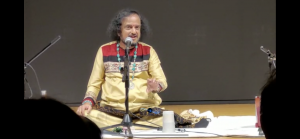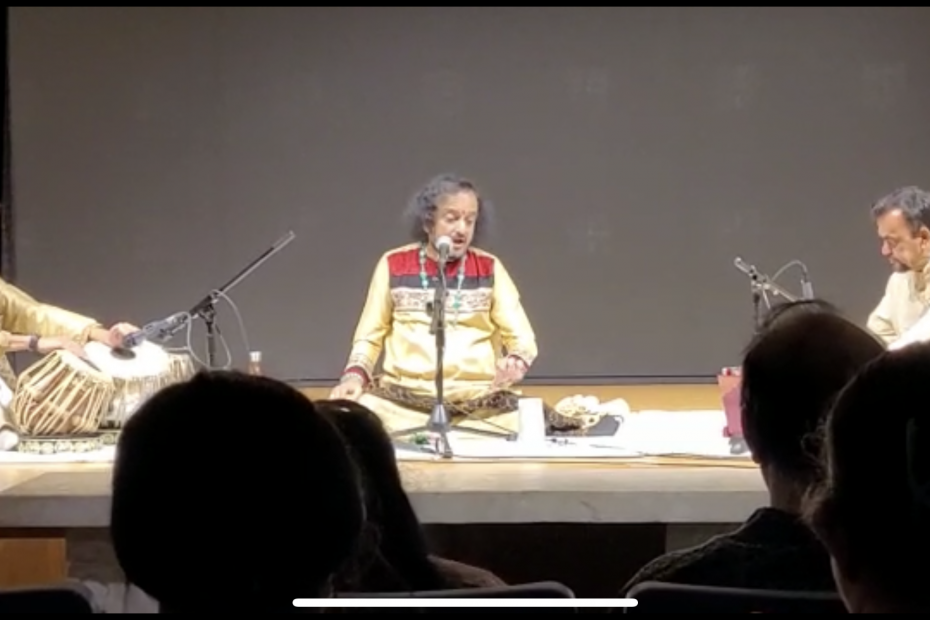Vocal Concert by – Pandit Kaivalyakumar Gurav, theme: “Songs of Dharwad”
Harmonium – Pandit Sanatan Goswami
Tabla – Pandit Subhen Chatterjee
May 13 2023
Dallas, TX
Author: Shyam Venkat and Venkatraman Subramanian
This Saturday’s (5/13/23) Hindustani classical recital at Unity of Dallas organized jointly by Mayura DFW and Sohara had the theme “Songs of Dharwad”. This was by Pandit Kaivalyakumar Gurav with Pt Subhen Chatterjee on tabla and Pt Sanatan Goswami on the harmonium. The poster snippet said “If there is anything sweeter than the Dharwad peda, it is the music!”. Pandit Kaivalya Kumar Gurav amply demonstrated this through the concert and it was truly a mesmerizing and wholesome experience for the audience.
Pandit Kaivalya Kumar Gurav’s presentation was an immersive experience with complete involvement and unmatched mastery on Laya and Shruthi.
The program began with a brief speech by Prakash Rao, President of Sohara, where it was explained how Dharwad in Karnataka has been a seat of Hindustani music with legendary artists, to name a few – Gangubai Hangal, Mallikarjun Mansur, Kumar Gandharva, Pandit Bhimsen Joshi, M Venkatesh Kumar, Jayatheerth Mevundi and so on. Pandit Subhen Chatterjee mentioned there will be a Q&A session at the end of the concert.
Pandit Kaivalya Kumar Gurav began the concert with a composition in Raag Jog. Later (violin) Venkatji explained the intricacies of Raag Jog which has two Gandhaars (Shuddh and Komal) which makes it a unique scale. Umamahesh ji mentioned to me about the adaptation of this raag in the Malayalam movie “His Highness Abdullah”!
It was an out of the world experience with Pandit Kaivalya Kumar Gurav unfurling the Raag both in the Vilambit and Dhrut phases with a catchy “bandish”. He traversed three octaves – mandara Sa to Sa to madhya and Tara sthayi. Absolutely flawless and pure!!

Pandit Kaivalya Kumar Gurav demonstrated several facets of hindustani music including various types of Taans, different types of voices and how they blend the same (vocal, chest, head). The artists ability to effortlessly traverse the three octaves and sancharas in unimaginable speeds with precision and clarity was mind-blowing. His ability to sustain the notes for an extended period demonstrates his incredible Sadhana and how lung capacity complements his musical prowess.
The second composition was the one in Raag Shree. Umamahesh ji was helping me with how the ragas Shree in Hindustani and Purina Dhanashree is equivalent to Carnatic Pantuvarali that have similar scales but different “chalans” (movement patterns). At the end of the first composition Panditji asked if he should continue with heavy classical or lighter ones – the audience wanted more classical. But due to time constraint Panditji explained and switched to lighter section of the concert.
Next was a Marathi abhang by Tukaram – Bolava Vithala Pahava Vithala. Clapping to the phrase Vittala Vittala by the audience at the prompting of Shuben Chatterji, was a very divine experience for all. The Abhang ended in a crescendo leaving the audience in a state of bliss.
Coming next was a song with the theme “sur” or swara. The phrase I could catch in the song was Alak Niranjan – a term used by Naada yogis as a synonym to the creator and to describe the characteristics of God and the self; Alak means the one who can’t be perceived and Niranjan means the one who is colorless.
Panditji moved on to the next session when it was Q&A. Rasikas requested for Bhagyada Lakshmi Barammma and a Kannada vachana. Hindustani style Bhagyada Lakshmi Baramma became immensely popular even in southern Karnataka with the 1983 Kannada movie – Nodi Swamy Naavirode Heege – that was sung by Pandit Bhimsen Joshi. Pandit Kaivalya Kumar Gurav sang in the same tune and that brought back good old memories. He ended Bhagyada in Tara Sthayi with an emotional plea to the Goddess to come and left quite a few in the audience in tears.
Vachanas have been an integral part of Kannada sahitya, with inclusion in the Karnataka school board language syllabus as well as the music board exams. Interestingly they have been adopted by Carnatic musicians as well for the latter half of the concert. Pandit Kaivalya Kumar Gurav sang a vachana in Bhairavi (carnatic sindhubhairavi). The Sindhubhairavi was just out of the world. He finally concluded the concert with the mantra – Sarva Mangala Mangalye.
Venkat ji gave the vote of thanks and talked of Mayura and Sohara and how they collaborated jointly to bring this program and also thanked Mallige Kannada Sangha of North Texas and Marathi Mandal for promoting the concert.Thank you Venkat ji and Vijayashreeji for your magnificent efforts in bringing this great artist to the Dallas audience. Pardon me for any discrepancies in this write up and thanks Venkatji for the opportunity to share my experience here. Looking forward to attending many more such beautiful concerts!
